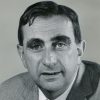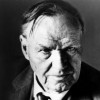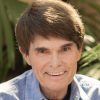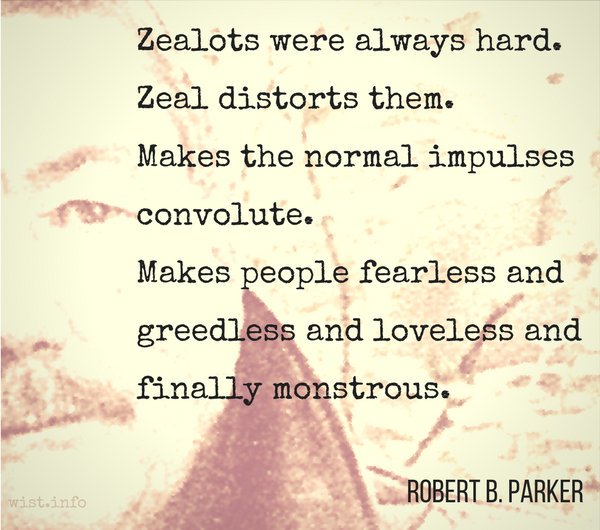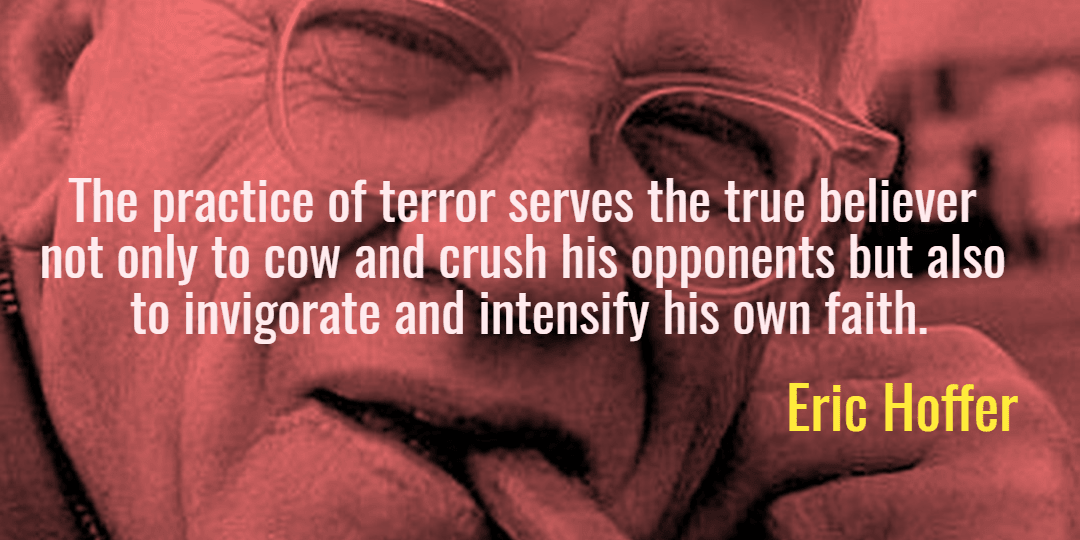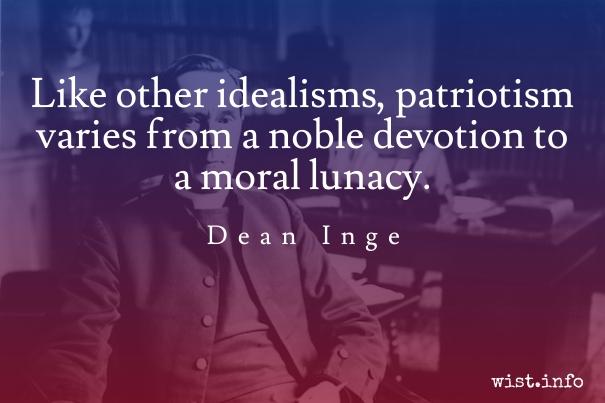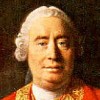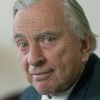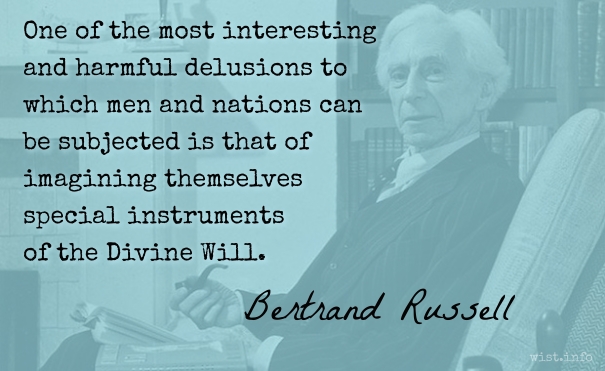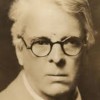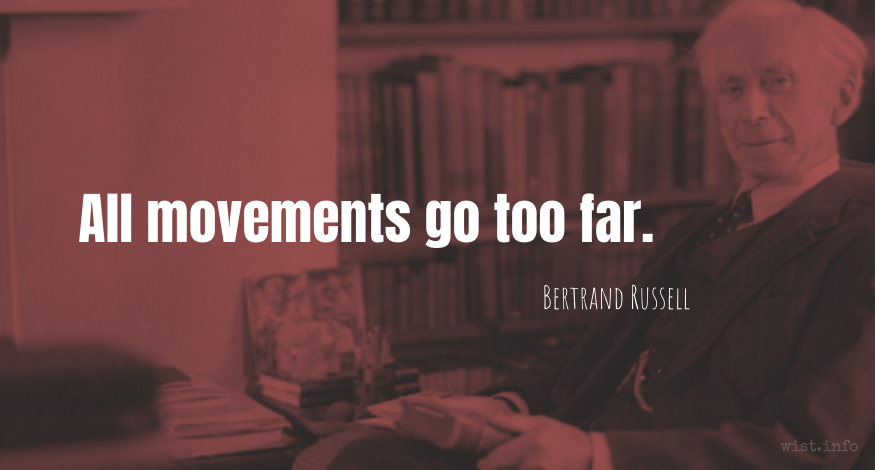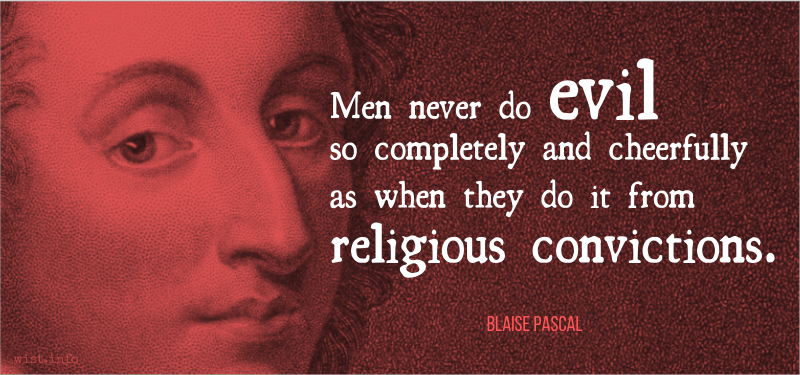It is the certainty that they possess the truth that makes men cruel.
[C’est la certitude qu’ils tiennent la vérité qui rend les hommes cruels.]
Anatole France (1844-1924) French poet, journalist, novelist, Nobel Laureate [pseud. of Jaques-Anatole-François Thibault]
(Misquotation)
Widely attributed (in French and English) to Anatole France, but not found in his works, including the one location it is sometimes cited from, Les Dieux Ont Soif [The Gods Are Thirsty, The Gods Are Athirst, The Gods Will Have Blood] (1912), in either English translation or, more importantly, in the original French.
While thematically keeping in the novel's depiction of the French Revolution and the Terror, the closest match to the quote I can find is this portion of ch. 22, talking about the expediting of the trials of those charged with counter-revolutionary crimes, eliminating the need to prove a misdeed by simply inquiring as to the accused's beliefs.
Justice thus abbreviated satisfied them; the pace was quickened, and no obstacles were left to fret them. They limited themselves to an inquiry into the opinions of the accused, not conceiving it possible that anyone could think differently from themselves except in pure perversity. Believing themselves the exclusive possessors of truth, wisdom, the quintessence of good, they attributed to their opponents noting but error and evil. They felt themselves all-powerful; they envisaged God.
[tr. Allinson (1913), Jackson (1921)]
Justice, thus curtailed, satisfied them; the pace was quickened and no obstacles were left to confuse them. They confined themselves to inquiring into the opinions of the accused, not conceiving it possible that anyone, except from pure perversity, could think differently from themselves. Believing themselves to possess a monopoly of truth, wisdom and goodness, they attributed to their opponents all error, stupidity and evil. They felt themselves omnipotent: their eyes had seen God.
[tr. Davies (1979)]
La justice abrégée les contentait. Rien, dans sa marche accélérée, ne les troublait plus. Ils s’enquéraient seulement des opinions des accusés, ne concevant pas qu’on pût sans méchanceté penser autrement qu’eux. Comme ils croyaient posséder la vérité, la sagesse, le souverain bien, ils attribuaient à leurs adversaires l’erreur et le mal. Ils se sentaient forts : ils voyaient Dieu.
[Original]
Quotations about:
fanaticism
Note not all quotations have been tagged, so Search may find additional quotes on this topic.
Can’t you understand that if you take a law like evolution and make it a crime to teach it in public schools, tomorrow you could make it a crime to teach it in private schools, and tomorrow you may make it a crime to read about it? And soon you may ban books and newspapers. And then you may turn Catholic against Protestant, and Protestant against Protestant, and try to foist your own religion upon the mind of man. If you can do one you can do the other, because fanaticism and ignorance is forever busy and needs feeding.
Nedrick Young (1914-1968) American screenwriter and actor [pseud. Nathan E. Douglas]
Inherit the Wind, film (1960) [with Harold Jacob Smith]
(Source)
The original 1951 play was written by Jerome Lawrence and Robert E. Lee, but does not include this line, delivered in the film by Spencer Tracy. Young and Smith share the screenwriting credits.
A fanatical group all together have a comfortable feeling that they’re all friends with one another. They are all very much excited about the same thing. You can see it in any political party. There’s always a fringe of fanatics in any political party, and they feel very cozy with one another; and when that is spread about and is combined with a propensity to hate some other group, you get fanaticism well developed.
Bertrand Russell (1872-1970) English mathematician and philosopher
Interview by Woodrow Wyatt, BBC TV (1959)
(Source)
Collected in Bertrand Russell's BBC Interviews (1959) [UK] and Bertrand Russell Speaks His Mind (1960) [US]. Reprinted (abridged) in The Humanist (1982-11/12), and in Russell Society News, #37 (1983-02).
I believe in evil. It is the property of all those who are certain of truth. Despair and fanaticism are only differing manifestations of evil.
Edward Teller (1908-2003) Hungarian-American theoretical physicist
(Attributed)
(Source)
Attributed in a personal communication from Judith Shoolery, in Istvan Hargittai, The Martians of Science: Five Physicists Who Changed the Twentieth Century (2006).
There is nothing in which Men more deceive themselves than in what the World calls Zeal. There are so many Passions which hide themselves under it, and so many Mischiefs arising from it, that some have gone so far as to say it would have been for the Benefit of Mankind if it had never been reckoned in the Catalogue of Virtues. It is certain, where it is once Laudable and Prudential, it is an hundred times Criminal and Erroneous; nor can it be otherwise, if we consider that it operates with equal Violence in all Religions, however opposite they may be to one another, and in all the Subdivisions of each Religion in particular.
Joseph Addison (1672-1719) English essayist, poet, statesman
The Spectator, #185 (2 Oct 1711)
(Source)
It is the uncompromisingness with which dogma is held and not in the dogma or want of dogma that the danger lies.
Samuel Butler (1835-1902) English novelist, satirist, scholar
The Way of All Flesh, ch. 68 (1903)
(Source)
If today you can take a thing like evolution and make it a crime to teach it in the public school, tomorrow you can make it a crime to teach it in the private schools, and the next year you can make it a crime to teach it to the hustings or in the church. At the next session you may ban books and the newspapers. Soon you may set Catholic against Protestant and Protestant against Protestant, and try to foist your own religion upon the minds of men. If you can do one you can do the other. Ignorance and fanaticism is ever busy and needs feeding. Always it is feeding and gloating for more. Today it is the public school teachers, tomorrow the private. The next day the preachers and the lectures, the magazines, the books, the newspapers. After a while, your honor, it is the setting of man against man and creed against creed until with flying banners and beating drums we are marching backward to the glorious ages of the sixteenth century when bigots lighted fagots to burn the men who dared to bring any intelligence and enlightenment and culture to the human mind.
He is onstage now to die, unrepentant to the last, and breathing the belief of all extremists always — that all misfortune comes from compromise and that only unyieldingness can win out.
Isaac Asimov (1920-1992) Russian-American author, polymath, biochemist
Asimov’s Guide to Shakespeare, “Henry VI, Part III” (1970)
(Source)
Regarding Clifford, the Lancastrian fanatic, in Act 2, sc. 6.
I believe in evil. It is the property of all those who are certain of truth. Despair and fanaticism are only differing manifestations of evil.
Edward Teller (1908-2003) Hungarian-American theoretical physicist
(Attributed)
Quoted in István Hargittai, The Martians of Science: Five Physicists Who Changed the Twentieth Century (2006), via Judith Shoolery.
The less depth a belief system has, the greater the fervency with which its adherents embrace it. The most vociferous, the most fanatical are those whose cobbled faith is founded on the shakiest grounds.
Dean Koontz (b. 1945) American writer [also writes as Leigh Nichols]
Forever Odd, ch. 33 (2005)
(Source)
TANNER: The true artist will let his wife starve, his children go barefoot, his mother drudge for his living at seventy, sooner than work at anything but his art.
George Bernard Shaw (1856-1950) British playwright and critic
Man and Superman, Act 1 (1903)
(Source)
The capacity of the human mind for swallowing nonsense and spewing it forth in violent and repressive action has never yet been plumbed.
Robert A. Heinlein (1907-1988) American writer
“Concerning Stories Never Written” (Oct 1952)
(Source)
This is no day for the rabble-rouser, whether he be Negro or white. We must realize that we are grappling with the most weighty social problem of this nation, and in grappling with such a complex problem there is no place for misguided emotionalism. We must work passionately and unrelentingly for the goal of freedom, but we must be sure that our hands are clean in the struggle. We must never struggle with falsehood, hate, or malice. We must never become bitter. I know how we feel sometime. There is the danger that those of us who have been forced so long to stand amid the tragic midnight of oppression—those of us who have been trampled over, those of us who have been kicked about — there is the danger that we will become bitter. But if we will become bitter and indulge in hate campaigns, the new order which is emerging will be nothing but a duplication of the old order.
Martin Luther King, Jr. (1929-1968) American clergyman, civil rights leader, social activist, preacher
“Give Us the Ballot,” Speech, Prayer Pilgrimage for Freedom, Washington, DC (1957)
(Source)
The practice of terror serves the true believer not only to cow and crush his opponents but also to invigorate and intensify his own faith.
Eric Hoffer (1902-1983) American writer, philosopher, longshoreman
True Believer: Thoughts on the Nature of Mass Movements, Part 3, ch. 14, § 85 (1951)
(Source)
Sorrow be damned & all your plans. Fuck the faithful, fuck the committed, the dedicated, the true believers; fuck all the sure & certain people prepared to maim & kill whoever got in their way; fuck every cause that ended in murder & a child crying.
Where men are the most sure and arrogant, they are commonly the most mistaken, and have there given reins to passion, without that proper deliberation and suspense, which can alone secure them from the grossest absurdities.
But the greatest of all the Reformers of the depraved religion of his own country, was Jesus of Nazareth. Abstracting what is really his from the rubbish in which it is buried, easily distinguished by its lustre from the dross of his biographers, and as separable from that as the diamond from the dung hill, we have the outlines of a system of the most sublime morality which has ever fallen from the lips of man: outlines which it is lamentable he did not live to fill up. Epictetus & Epicurus give us laws for governing ourselves, Jesus a supplement of the duties & charities we owe to others. The establishment of the innocent and genuine character of this benevolent Moralist, and the rescuing it from the imputation of imposture, which has resulted from artificial systems,* invented by Ultra-Christian sects, unauthorized by a single word ever uttered by him, is a most desirable object, and one to which Priestley has successfully devoted his labors and learning. It would in time, it is to be hoped, effect a quiet euthanasia of the heresies of bigotry and fanaticism which have so long triumphed over human reason, and so generally & deeply afflicted mankind; but this work is to be begun by winnowing the grain from the chaff of the historians of his life.
* e.g. The immaculate conception of Jesus, his deification, the creation of the world by him, his miraculous powers, his resurrection & visible ascension, his corporeal presence in the Eucharist, the Trinity, original sin, atonement, regeneration, election, orders of Hierarchy, Etc.
Thomas Jefferson (1743-1826) American political philosopher, polymath, statesman, US President (1801-09)
Letter to William Short (31 Oct 1819)
(Source)
It is not to be supposed that the age-old readiness to try to convert minds by pressure or suppression, instead of reason and persuasion, is extinct. Our protection against all kinds of fanatics and extremists, none of whom can be trusted with unlimited power over others, lies not in their forbearance, but in the limitations of our Constitution.
Robert H. Jackson (1892-1954) US Supreme Court Justice (1941-54), lawyer, jurist, politician
American Communications Association v. Douds, 339 U.S. 382, 438-439 (1950) [concurrence and dissent]
(Source)
But we must not forget that in our country are evangelists and zealots of many different political, economic and religious persuasions whose fanatical conviction is that all thought is divinely classified into two kinds — that which is their own and that which is false and dangerous. Communists are not the only faction which would put us all in mental straitjackets.
Robert H. Jackson (1892-1954) US Supreme Court Justice (1941-54), lawyer, jurist, politician
American Communications Association v. Douds, 339 U.S. 382, 438 (1950) [concurrence and dissent]
(Source)
When religion becomes a mere artificial façade to justify a social or economic system — when religion hands over its rites and language completely to the political propagandist, and when prayer becomes the vehicle for a purely secular ideological program, then religion does tend to become an opiate. It deadens the spirit enough to permit the substitution of a superficial fiction and mythology for the truth of life. And this brings about the alienation of the believer, so that his religious zeal becomes political fanaticism. His faith in God, while preserving its traditional formulas, becomes in fact faith in his own nation, class or race. His ethic ceases to be the law of God and love, and becomes the law of might-makes-right: established privilege justifies everything. God is the status quo.
Turning and turning in the widening gyre
The falcon cannot hear the falconer;
Things fall apart; the centre cannot hold;
Mere anarchy is loosed upon the world,
The blood-dimmed tide is loosed, and everywhere
The ceremony of innocence is drowned;
The best lack all conviction, while the worst
Are full of passionate intensity.William Butler Yeats (1865-1939) Irish poet and dramatist
“The Second Coming,” ll.1-8 (1920)
(Source)
More examination of this quotation: The Best Lack All Conviction While the Worst Are Full of Passionate Intensity – Quote Investigator. See also Russell and Bukowski.
All movements go too far.
Bertrand Russell (1872-1970) English mathematician and philosopher
“On Being Modern-Minded,” The Nation (1937-01-09)
(Source)
Men never do evil so completely and cheerfully as when they do it from religious convictions.
[Jamais on ne fait le mal si pleinement et si gaiement, que quand on le fait par un faux principe de conscience.]
Blaise Pascal (1623-1662) French scientist and philosopher
Pensées, ch. 14, Appendix: Polemical Fragments #895 (1669) [tr. Trotter (1910)]
(Source)
Also labeled as Part 2, Article 17, # 53. Sometimes also shown in slightly shorter French as "Jamais on ne fait le mal si pleinement et si gaiement que quand on le fait par conscience."
(Source (French)). Alternate translations:
- "We never do evil so fully and cheerfully as when we do it out of conscience." [#813 (#895), tr. Krailsheimer]
- "We never do evil so completely and cheerfully as when we do it out of conscience." [Miscellaneous Thoughts 7: Sellier #658/Lafuma #813, tr. Ariew]
- "Men never do evil so completely and cheerfully as when they do it conscientiously."
“My Country, right or wrong” is a thing no patriot would think of saying except in a desperate case. It is like saying, “My mother, drunk or sober.”
Gilbert Keith Chesterton (1874-1936) English journalist and writer
The Defendant, ch. 16 “A Defence of Patriotism”
(Source)




